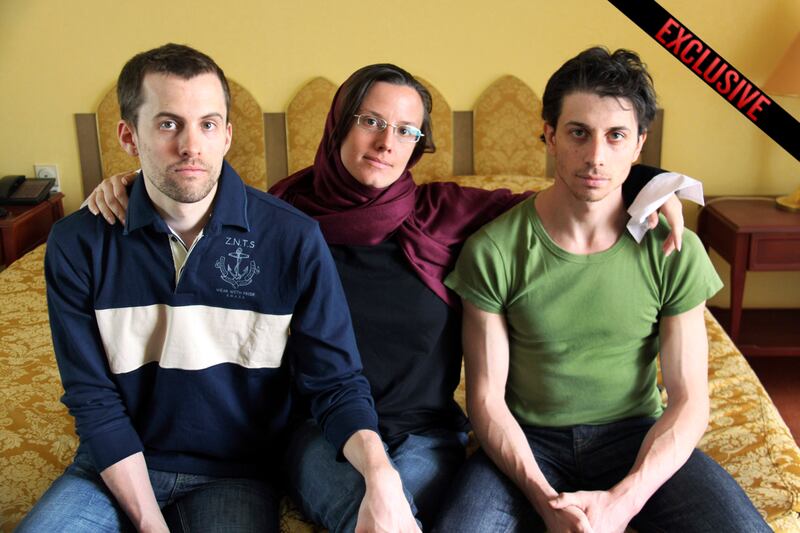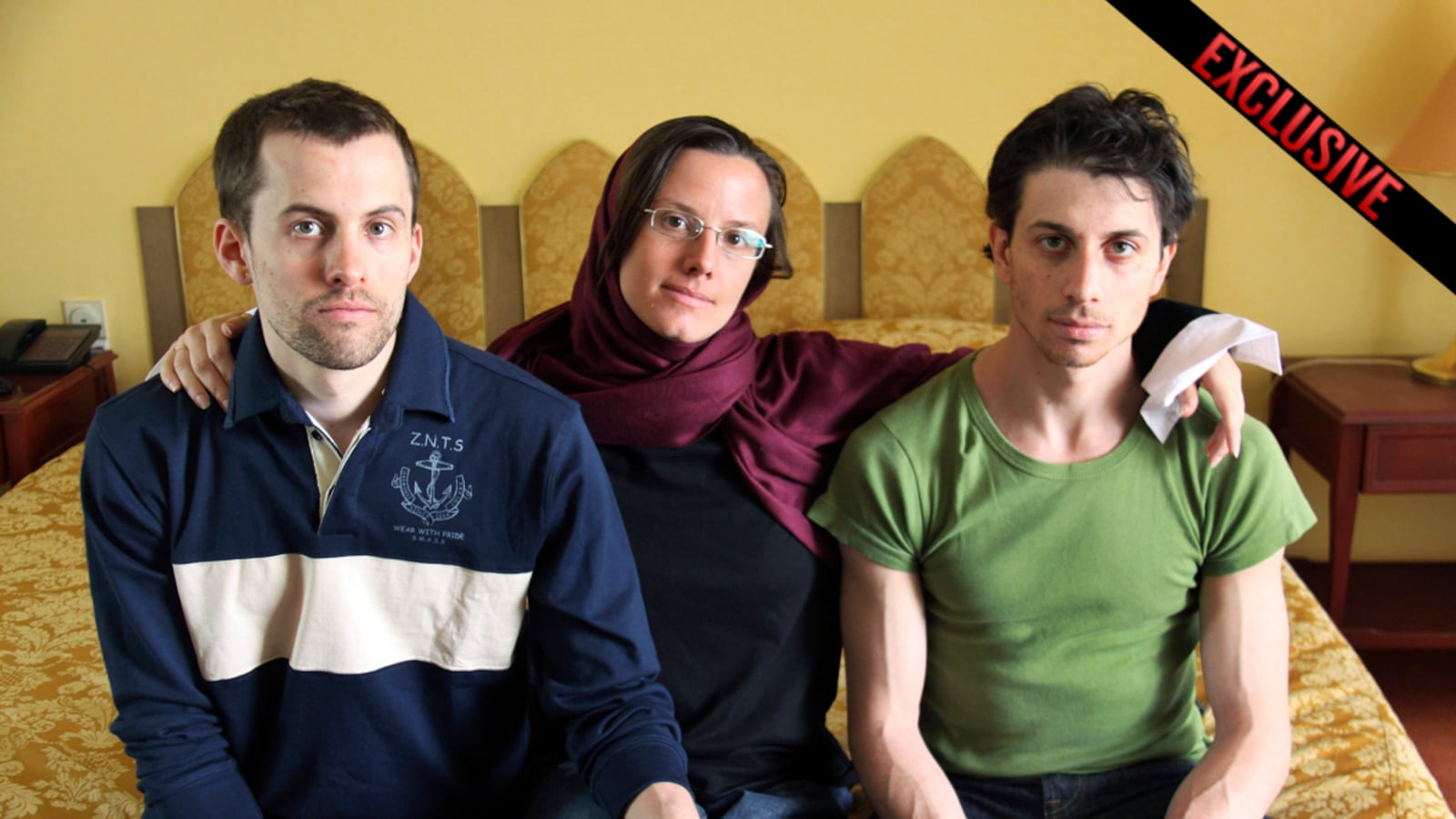Editor's note: This article was originally published on September 13, 2011. It has been updated to reflect the release of Josh Fattal and Shane Bauer.
Sarah Shourd’s boyfriend had woven the ring using the threads of a red T-shirt and a white bathroom towel. And on that cold night in January 2010, when he saw her in the courtyard of their fearsome Iranian prison during the scant 45 minutes of the day the young Americans were allowed to meet, Shane Bauer got down on one knee, showed her what he had crafted and popped the question. “I remember it had been a particularly bad day,” Sarah recalled during one of many conversations we had this summer. “I’d been having trouble finding a lot of hope and heart.” And suddenly, “I thought, oh, my God, this is one of the most important moments of my life. I need to have a good response.” All she could stammer, however, was, “It would be an honor.” Bauer looked at her confused. “Is that a yes?” he asked. She nodded: Yes! Yes!
They had been prisoners in Iran since July 31, 2009. In September 2010, the regime chose to release Sarah. Immediately upon her return to the West, she began lobbying for the freedom of Shane Bauer as well as Josh Fattal, the other American backpacker jailed with them when they strayed across the border from Iraqi Kurdistan. After months of delays, the two men finally stood trial this summer, with an Iranian court sentencing them to eight years in prison for crossing an unmarked border and for espionage (a charge that both President Obama and peace experts have tried to debunk). Finally this week, a bail was set for the hikers and they were released on Wednesday.
Bauer, Fattal, and Shourd have come to be known collectively around the world as “the hikers,” as in “Free the Hikers!,” the slogan of the campaign their mothers launched in the weeks after they were arrested. Sarah thinks it’s ironic, since she never really went hiking until that catastrophic jaunt two years ago. Since leaving Iran, she has inhabited a kind of purgatory—free to try to help Shane and Josh, but trapped in an exhausting helplessness. She’s written daily letters to the two prisoners, although she knows they might never receive them. She’s been constantly whirling about, from campus lecture halls to press conferences at the United Nations, in her attempt to gain public support for their release. At night, Sarah sleeps with her cellphone in her hand, because the one time Shane called her from Iran, she didn’t hear the phone ring.
Over several months, in the most extensive interviews they’ve done about their ordeal, Sarah Shourd and the families of Shane and Josh detailed to Newsweek/The Daily Beast what happened, and how they’ve coped. “A lot of people think, what the hell were they doing there?” says Natalie Avital, a documentary filmmaker who is making a movie about the hikers. “They think Americans should go to Yosemite or the Rocky Mountains.”

But the 20-something idealists thought nothing of spending a week in Iraq. They had loved the outdoors and had been globetrotting for years. “I think the first time he traveled was days before he was 18,” says Cindy Hickey, Shane’s mother. In high school, he took a job welding radio parts to make extra money to travel abroad. That first trip, he went to Kosovo, Turkey, and Yemen. At 19, he returned to the Middle East to study Arabic. His roommate at the University of California, Berkeley, was a similarly adventurous spirit. In high school, Josh used to pitch a tent in his own backyard, where he slept when it was warm enough. His first summer in college, he turned down his mom’s offer for a plane ticket home. Instead, he pedaled the 3,800 miles on a bicycle over 42 days.
Although Shane and Sarah attended the same college, they didn’t meet until after graduation. They were both in Oakland, Calif., at a rally protesting the war in Iraq, and they bonded while police officers fired rubber bullets at them. Shane was working as a freelance journalist, and he stayed in touch with Sarah as he jetted to Yemen, where he wrote stories critical about U.S. foreign policy. “I fell in love with the Middle East the same time I was falling in love with Shane, through Shane,” Sarah says. “That was a big part of our connection.” In 2008, after dating for several years, the couple moved to Syria together. They lived in a converted Palestinian refugee camp, and Sarah taught English and took Arabic classes.
In July 2009, they had a week of vacation. Josh was visiting, and they all traveled to northern Kurdistan. “It’s not a war zone,” Sarah says. “We got excited about this place.” They visited a museum, drank tea, and, at the recommendation of locals, decided to visit a waterfall in the mountains. They arrived at night and camped outside, eating a supper of beans. The next morning, they found the waterfall. Sarah dipped her feet in the cool water, and they filled up bottles from a nearby spring. They put their sleeping bags in a larger plastic trash bag, hiding it behind a rock, figuring they could pick it up in a few hours on their way back. Sarah had not gone far when she looked up and saw a soldier with a gun waving at her from a ridge in the distance.
The soldier gestured for them to come his way. As they approached, he pointed to the ground and said “Iran.” “I didn’t understand. Are we in Iran?” Sarah remembers thinking. “I didn’t think I had anything to be scared of. I was just very confused. He told us to come with him.” They got into an off-road vehicle and stopped at the first town they came to. “The police officers bought me a head scarf,” Sarah says. “I was wearing short pants and a T-shirt, so I was inappropriately dressed for Iran. They couldn’t even take me to the police station.”
After days of questioning, they were told they could go home. A vehicle picked them up, supposedly headed for the airport. Instead, it unloaded them on the steps of one of the most dangerous prisons in the world. Built in 1972 under the shah, Evin Prison is now a torture chamber for political dissidents and journalists. Many inmates are held on spurious charges, and Iran’s murky judicial system makes it easy for the government to hold them indefinitely. In 2009, Newsweek reporter Maziar Bahari spent 118 days there; he was denied a lawyer and was questioned about being a spy.
Sarah kicked and screamed as she was yanked away from Shane and Josh. Her cell was 10 by 14 feet. It had no bed. “The lights are always on,” Sarah says. “Neon lights. It’s part of the torture.” A guard took her clothes, her possessions. and her eyeglasses. Since she’s nearsighted, the first month inside her cell was a blur. She punched the walls so hard her knuckles bruised. “I never screamed like that before,” she says. “Very few human beings know what it’s like for a scream to come rising up out of you, and you don’t even know it’s coming.”
She went on a hunger strike until they let her see Shane. Every day, Sarah would be dragged into a room with an interrogator. The man had demanded her email passwords and now seemed to know all about her family. Whenever she asked if she was being questioned for something other than crossing a border—“It seems like you think I’m a spy,” she recalls saying to him—the interrogator would look away nervously and say, “Oh, no, no, no!” She finally persuaded him to give her a dictionary to read, after telling him that Malcolm X had one in jail.
Back in the United States, the families each received a phone call from the State Department, saying their children had been detained. The details were scarce at first, but as the weeks dragged on, they banded together to organize a campaign, raise awareness of what happened to their children, and push for their release. “We’re told the State Department is doing everything they can,” Cindy Hickey said earlier this summer. “There’s no way for us to know. All I know is that my son is not home, and I’m not happy about that.” When Al Bauer, 54, heard the conditions of Shane’s prison cell, he went into his bedroom. He closed the blinds. He shut the door. He sat on the floor to imagine what life was like for his son. “I got stir crazy. I had to get out. I made it 45 minutes.”
In prison, breakfast was bread and cheese; lunch was a kebab; dinner was a cold piece of meat with a tomato. To go to the bathroom, Sarah would have to ring a bell and then sometimes wait an hour before a guard would come and escort her blindfolded down a hall. She saw Shane and Josh in a courtyard for only 45 minutes a day, during hava bokhor (Farsi for “eat the air”), under video surveillance. Unlike Sarah, the men, at least, shared a cell and had each other for constant company. For several hours a day, they exercised together.
Slowly the days passed into months, then a full year. And then one day, a guard came into Sarah’s cell and told her that a judge wanted to meet with her. She wasn’t taken to a courtroom but to a small office, where a man behind a desk told her that she would be freed on bail. She started sobbing when she heard the men weren’t so lucky. She had been in prison for 410 days. Why couldn’t she take Shane and Josh home with her? The judge said they were releasing Sarah only because she was a woman and had served a harsher sentence in solitary confinement. She left Iran for Yemen, where she had a tearful reunion with her mom.
But when Sarah returned to her family in Oakland, she didn’t feel free. She felt numb, as if she had entered a different kind of jail. “There was a time in my life when I never imagined being in prison,” she says. “It’s hard for me to go back and think about life as it was before. I’m a changed person.” She stops herself. “I’m the same person. But there’s not a second of the day that I’m not thinking about prison. That form of suffering is imprinted on my memory.” In April, a clinical psychologist diagnosed her with posttraumatic stress disorder. “I had been so inactive in prison—in the beginning I had a lot of energy and felt unstoppable,” she says. “I realized at around month five or six, I couldn’t stop. I get triggered by things that remind me of prison and get panic attacks. And there’s hyperarousal, which means you can’t turn your brain off because you’re obsessed with something.”
On a summer afternoon, Josh’s mother, Laura Fattal, meets me at the door of her house, in a small suburb outside of Philadelphia, where there’s a flier at the door that was part of the campaign last year. She opens her freezer to show me an assortment of plastic bags with very old-looking food in them. “Here’s the Halloween candy, the Kit-Kats from this year,” she says, digging through the bags of food that she’s saved for her son’s return. “The chocolate-chip cookies I made on his birthday. I made these mini muffins and I saved them for him. I think this is pumpkin cake. It’s taking up room, but I don’t care.” She concedes, “It’s wacko, I know it’s wacko. But he’s with us.”
She leads me to Josh’s old bedroom. There are signs that a young boy lived here—like the eight basketball trophies on the shelf, but it now looks more like a makeshift campaign office. There are posters, photographers of the mothers marching outside the Iranian Mission to the United States, and a wool sweater she had purchased to send him—until she learned that the prison had sufficient heat. Laura has written Josh more than 700 email letters, one for each day he’s spent in prison. “You learn from everything,” Laura says. “But I don’t know what I’ve learned from this. This is a horrible thing. Horrible. I would never wish it on anyone.”
A few weeks later, Shane’s mother, Cindy, greets me at her farm outside Pine City, Minn. She used to have a business here as a sled-dog trainer, but she closed it down after her son was taken captive. As the seasons change, she imagines what he would say if he were there, able to smell the fresh air. “I have dreams about Shane,” Cindy says. “We’re sitting and talking. He’s sharing things with me, and I’m sharing things with him. When that happens, it’s a relief for me because it’s feels like we’re really having a conversation.”
As for the spying charges, she says: “We had a lot of conversations in this living room about prisoners being detained unjustly. He’s been very critical of U.S. policy in the Middle East. Once in a while, I get the question, how would you know? I know my son. He’s not working for the U.S. government, I guarantee you.”
Sarah says the only way she’s been able to get through the uncertainty of these past two years is by imagining what her life will be like when Shane and Josh are home. “Shane is going to get out and see everybody tethered to their electronic devices,” she says one afternoon, during a walk through New York’s Central Park. “It’s going to be crazy.” She envisions him saying, “iPad! What’s an iPad?”
As she worked media and lecture halls, Sarah always made sure her ring made of towel thread remained on her finger. Then, last spring, she went to Chicago to meet Noam Chomsky, who was offering to help with her campaign. She was running late. In the taxi, she felt a sudden wave of panic. She couldn’t find the ring. She asked the driver to pull over. She ran into the street. She checked the seat cushions. It was no use. Her engagement ring was gone.





